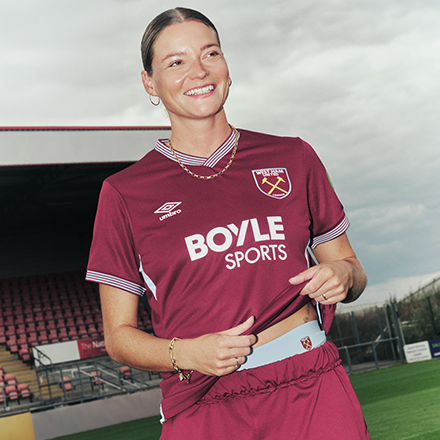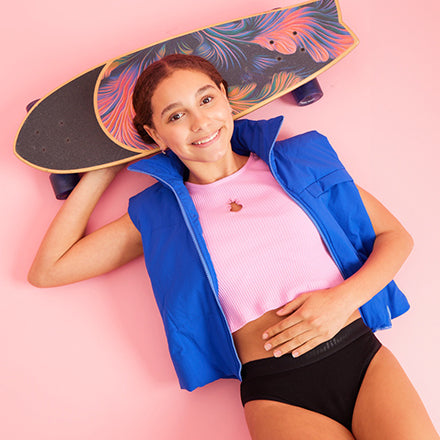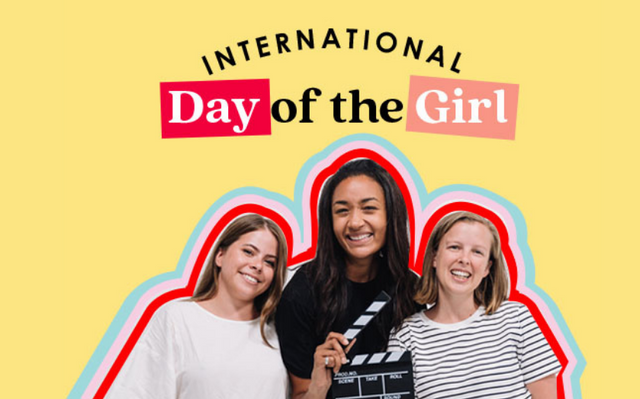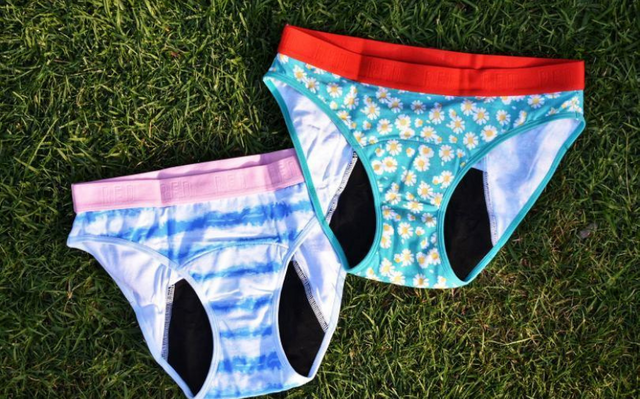Keisha Leon is a contemporary designer, proud Waanyi, Kalkadoon and Chinese woman, and a business owner who creates unique designs which connect to her own journey navigating her cultural identity and personal experiences.
When Keisha connected with Modibodi to discuss creating a Limited Edition print we felt an immediate synergy because of her entrepreneurial nature, her desire to speak out and break taboos around social issues, women’s health and period poverty, and of course her enormous creative talent.
Tell us about Leon Design
I started Leon Design because I wanted to go out and find liberation in working for myself and further services social spaces, as well as my explore my own identity and process.
Can you share the story behind the designs you’ve created for Modibodi?
When I was creating the designs, initially they were reflective of how I was personally feeling at the time, as well as my thoughts around social barriers for women’s health, including period poverty.
The designs reflect my own journey at a time when I was trying to fall pregnant and learn to better understand my own body and menstrual cycle.
It’s about my journey, about being a woman, about getting in touch with my cycle and the way the mind, body and spirit change as you’re on your own journey.
I want to challenge the norms, structures and barriers to ownership of our bodies, to take that ownership back, to have a loud voice and use positive energy to change the world.
STRENGTH
This design is about speaking out to create change and providing a platform to give strength to the voices of women who have been marginalised, underestimated, under-valued or silenced.
JOURNEY
The three colours in this design represent each individual’s unique connection to their body, mind and spirit; and how these connections are different for everybody, and constantly evolving. No menstrual journey is the same and we define and re-define what those experiences mean to us; our experiences bind us together giving us strength along the way.
What’s the biggest challenge in running your own company?
When running your own company you open yourself up in a different way. The ‘why?’ you’re doing it is also really important to me. Firmly standing by my values and making sure they are ingrained in the process and outcomes. It’s so important to have a purpose, to come into an industry and to leave it better than you found it. Running a business is new to me, and I am constantly learning along the way, but it is also very rewarding to be able to be your own boss, and take control of your own journey. Opening yourself up, being vulnerable and allowing yourself to take risks and diving into the unknown is what I’ve found the hardest part of running my own business; but also what is necessary to move forward.
I really hope to have an impact in my industry, advocating for social change, and doing so in a way that doesn’t play into the problems in the industry or perpetuate the problems further.

Why do you think Modibodi and Leon Design are a good fit?
I believe both Modibodi and Leon Design align because we’re both interested in women’s health, and we’re both businesses run by women who are exploring social issues and looking for ways to have an impact. I’ve always felt connected to what Modibodi stands for and have always worn the product because I think it’s so important to talk about women’s health, to open up taboo topics and to create conversations and have a positive narrative about our health and our bodies.
What advice would you have for up-and-coming designers?
My advice is to celebrate your differences, build a good support community around you and to understand your ‘why’, to know why you’re doing this and what kind of impact you want to have. That’s how I approach my business, and a good foundation to start the journey to wherever it will take you.
Can you tell us about your background as Waanyi, Kalkadoo and Chinese woman?
My background is as a Waanyi, Kalkadoo, Chinese, and my mother is Caucasian. I grew up on Country in Mt Isa (Kalkadoon). My cultural identity has played an integral role in my upbringing, my journey, how I approach designs and how that connects with people. I go back home to continue that connection, to ground myself, and connect with who I am and my family.
How does design help communicate complex issues or provide a voice for different groups of people?
As the visual language for society, I believe design and creative industries pay an integral role in driving change and progress. Visual communication helps break down barriers, to inform people and to bring them close together. At the same time, creative industries can also play a role in not doing enough, or in perpetuating problems, so I feel it’s really important for creatives to have a platform to tell their own story and to write new narratives and bring people together.
It’s important for creatives to both have their own platform to tell their personal story, as well as to hear different voices in the industry and tell the narratives of other in order to hopefully better connect people to the world around them.
Congratulations on your pregnancy. What values do you want to instil in your child?
The most basic values to instil are empathy, compassion and kindness. I want my child to know who they are, that they can make a difference; and to know that they’re always loved.











